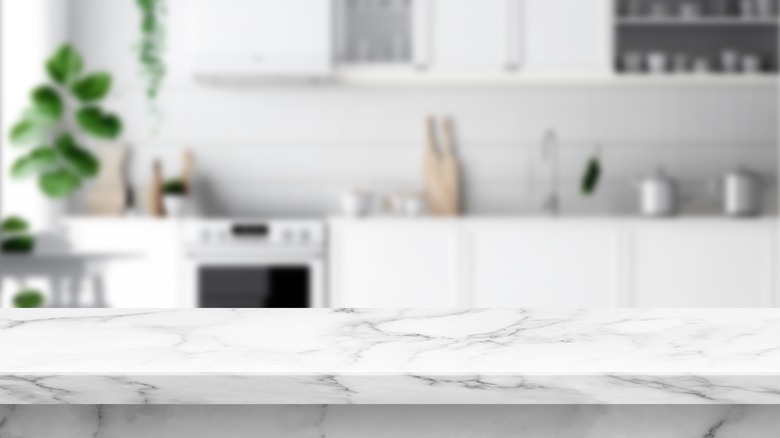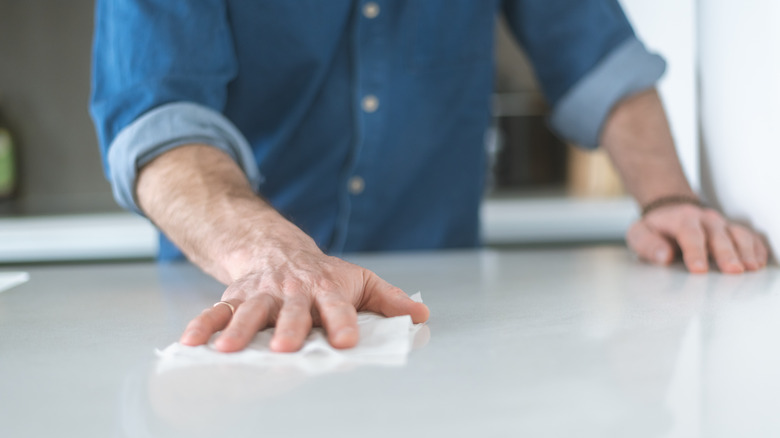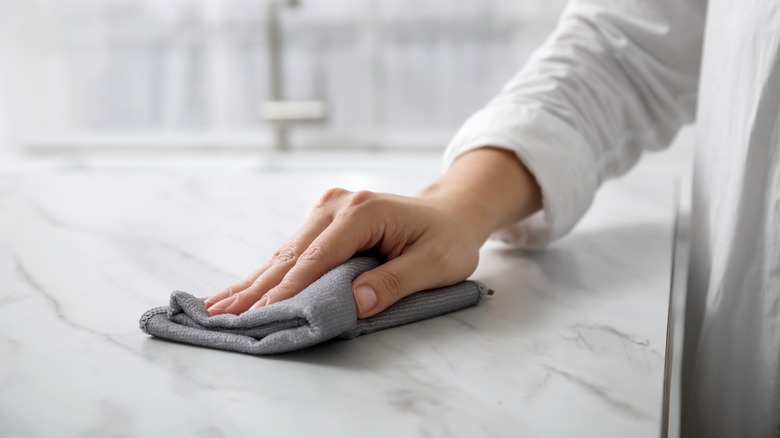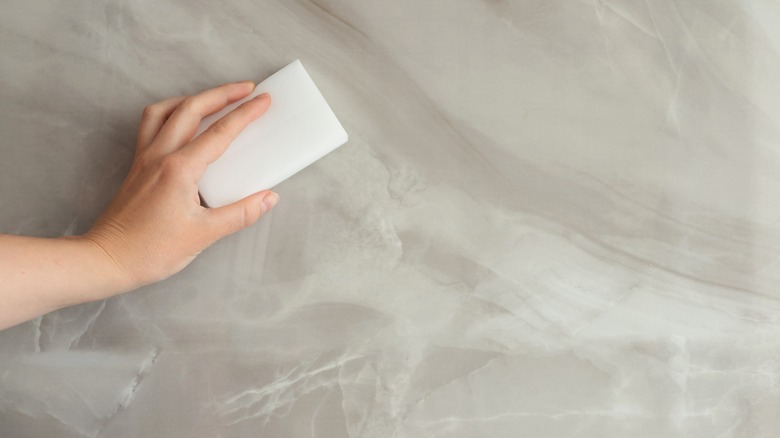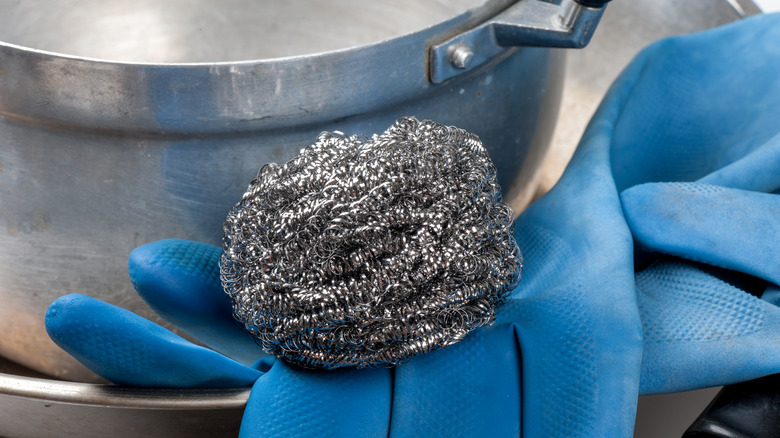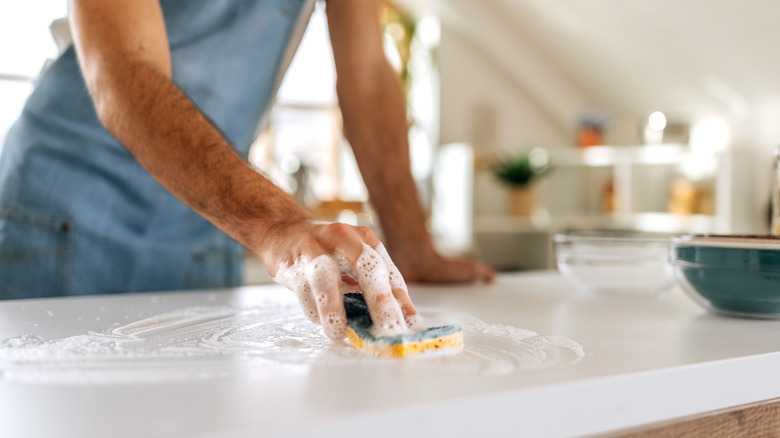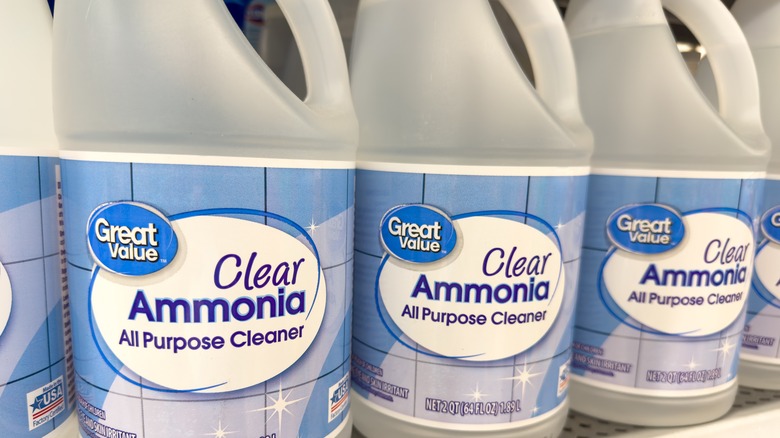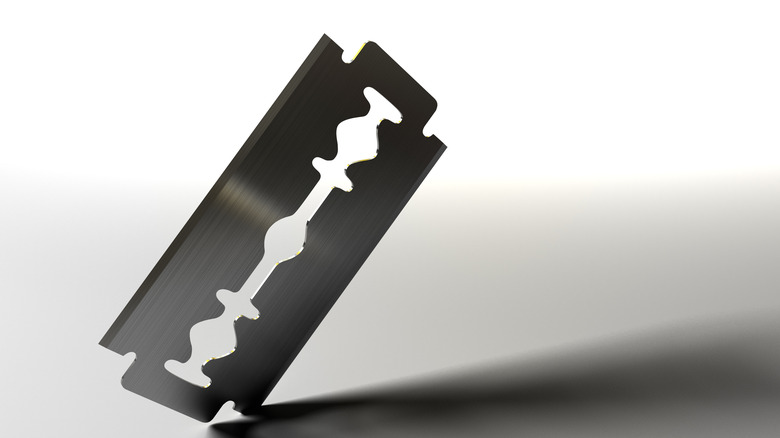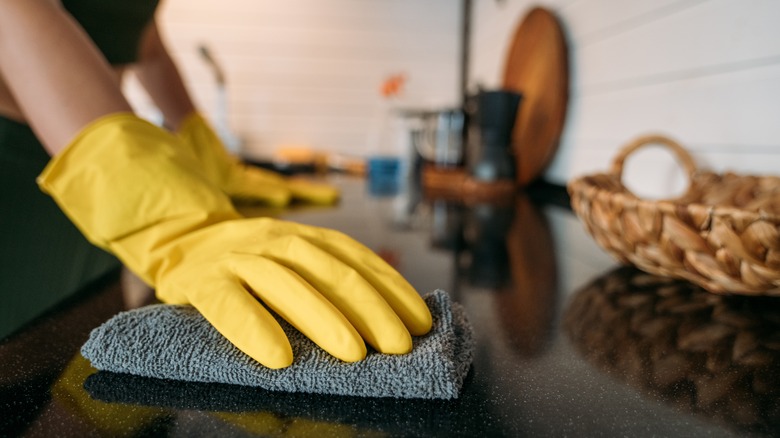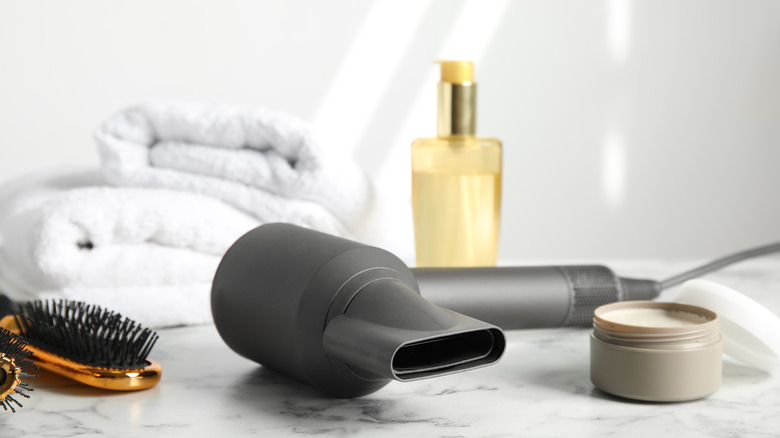Quartz Countertop Cleaning Mistakes Everyone Makes
We may receive a commission on purchases made from links.
Quartz countertops are quickly becoming the go-to countertops in modern kitchens. According to Statista, in 2023 and 2024, 46% of people chose quartz above all other options for their kitchen remodels. And there's a good reason why. Quartz is much more heat and stain-resistant than marble, and it comes in more contemporary designs than granite, making it a win-win. However, as more and more people are installing this material in their kitchens, it's important to know how to properly clean and maintain it. While low maintenance and extremely sturdy, quartz countertops still need to be taken care of in a certain way in order to keep their integrity. And that means not coming into contact with certain cleaning products.
Since quartz has a reputation for being extremely hardwearing, many people believe you can use any kind of cleaning product on it. But there is a whole list of products you shouldn't use, from disinfectant wipes to vinegar. While these products might not cause etching on the counter immediately upon contact (like, say, with marble), continual use can eventually dull or discolor the stone. To prevent your beautiful countertops from turning dingy and marked, avoid these very common cleaning mistakes.
Disinfecting with Clorox wipes
Is your quartz countertop looking a little grimy? Or did you finish preparing raw chicken and some juices splattered on the pristine, white surface? If so, you might be tempted to reach for a trusty disinfectant wipe to remove the worst of the gunk and bacteria. But that might not be the best idea. You should avoid cleaning quartz countertops with certain disinfectants because they can eat away at the surface, leaving behind dull spots that can change color. It can also compromise the counters for future wear and tear. The reason for this is because some disinfectant formulations have citric acid. This substance is quite acidic, which will wear down the surface over continual use.
If you want to disinfect your countertops, then you might feel like more than regular soap and water is needed. In that case, you can still use disinfecting wipes; just make sure they don't have any harsh cleaners like citric acid or bleach. Or, if you would rather not risk it, you can use rubbing alcohol instead. Create your own DIY solution by mixing a 2:1 ratio of rubbing alcohol to water in a spray bottle. Apply it to the counters, wipe them clean with a microfiber cloth, and allow the smell to dissipate before preparing any food.
Cleaning the surface with undiluted vinegar
If you're the type of person who is cutting back on harsh cleaners in the kitchen, then you might have embraced vinegar as an all-natural cleaning spray. But is it a good idea to use vinegar to clean quartz countertops? It might seem harmless, but if you don't dilute it, it can eat away at your surface. It has a pH level of about 2.5, making it rather acidic. In comparison, weak acids land between 4 and 6 on the pH scale. After repeated use, you might begin to notice slight etching in the surface, or even discoloration.
You might be tempted to use undiluted vinegar to disinfect the countertops or fight tougher stains and spills, but refrain from doing that if you want to keep them in pristine condition. Instead, weaken its acidity by cutting it with water. Create a solution that is one part vinegar to one part water in a spray bottle, and spray down the surface. Wipe it clean with a microfiber cloth. To ensure no acidic residue is left behind, wipe down the surface once more with a clean, damp cloth. This solution is not only safe for your countertops, but is also strong enough to tackle difficult stains like hard water spots.
Using brightening pads like Mr. Clean Magic Erasers
Mr. Clean Magic Erasers are great cleaning tools for when you have stubborn scuffs or dried-on stains. They may feel soft to the touch, but since they're made from a course material called melamine, they're abrasive on stains. They act as very fine sandpaper, gently buffing away the splotch from view. While that might be great for those of us who don't want to spend half an hour furiously scrubbing at a dried spatter on our countertop, it might not be the best thing for a quartz countertop. These sponges leave behind tiny scratches in the surface, which you can't see at first with the naked eye. But after repeated, continual use, these scratches will add up and will make the counter appear duller.
If you're dealing with a tricky stain that requires an abrasive solution, consider using baking soda as a safer alternative. The fine powder has some grit to it, so it will help remove whatever is sticking to the surface, but it's still much gentler than the melamine sponge. It's also great for spot-treating slight discolorations. To create the paste, add about 3 tablespoons of baking soda into a bowl. Then, add just enough water to turn it into a slurry. You don't want it to be runny, but you also don't want it to be thick and sandy. Apply the paste to the stain, allowing it to sit for about an hour. Finally, wipe it away with a cloth dipped in warm water.
Using steel wool pads
If Magic Erasers are too abrasive for quartz, then steel wool pads are definitely a no-go. These scouring sponges, typically used for cleaning heavily soiled pots and pans or inside ovens, are great for tackling stubborn grease, but are a nightmare for your countertops. Made of tiny shavings of metals, from stainless steel to aluminum, these hardworking sponges are can cause noticeable damage. If you have ever held one without gloves, you'll know that they're prickly and can hurt. And if your skin doesn't like it, your quartz countertops won't either. Repeated use can cause micro abrasions, leading to a dull surface.
Instead, downgrade to soft nylon sponges, like the ones you normally use to wash the dishes. These are soft enough that they won't scratch the countertop's surface, but strong enough that they can still remove dried up food splotches. Since it's not likely you will have difficult residue like caked-on grease to clean off your countertops, you won't need anything quite as abrasive as a Brillo pad to clean it. (And if you do — say, by the stove — simply use a degreaser to loosen the stain's hold on the counter). When in doubt, use a sponge that can safely be used to clean non-stick pans. They're gentle enough to tackle residue without removing the pan's coating, which means they will be gentle enough for your quartz surface.
Not cleaning spills immediately
One of the perks of getting quartz countertops over marble ones is that they stain less easily. And while you don't have to chase down spills with a wet rag the second they happen, you still don't want to allow stains to linger for too long. While quartz is durable, it's not indestructible. This is especially true if you spill something acidic, such as coffee, tea, wine, or lemon juice. Allowing it to sit on the counter can potentially discolor it. You also want to avoid allowing very alkaline solutions, such as egg whites, to sit on the surface. While these won't etch the surface the second they touch it, they can create noticeable stains if left on for days, for example.
So, how can you clean your quartz countertops? All you really need is some warm water and dish soap. Pour warm water into a bowl and add a drop or two of dish detergent. You don't want to overdo it, or else you will be stuck wiping off sticky soap from the counters. Dip a microfiber cloth or sponge into the solution, and use it to wipe down the counters. Follow it with a clean cloth saturated with water to remove the residue.
Washing it with well water
If your home isn't connected to a municipal water line, then your house most likely uses well water. If that's the case, you want to avoid using it to clean your quartz countertops. That means you shouldn't use water from the tap to create your soap and water or vinegar and water cleaning solutions. Repeated, consistent use can create a cloudy residue on your counters that can be difficult to remove. This light haze will form because well water is hard water, containing a high concentration of minerals, such as magnesium and calcium. When the water evaporates, the minerals are left behind, creating a white layer that is hard to remove with simple soap and water. Instead, you usually need to use something acidic like vinegar or lemon juice to remove it, which can spell disaster for quartz.
You can do one of two things to prevent this. If you prefer to keep using soap or vinegar as your cleaner, then you will need to add in the extra step of wiping the counter dry after cleaning it. Wiping it down with a microfiber cloth will help remove the water and its minerals from the surface, keeping it safe from buildup. If you're worried that won't be sufficient to keep the white haze at bay, then your second option is to use a quartz-safe cleaner. An example is the Stone Pro Quartz Countertop Cleaner, which retails for $20 on Amazon. This removes water from the equation entirely.
Using products containing ammonia
If you're the type of person who prefers to buy, rather than DIY, cleaning products, then you will most likely invest in either a specialty or all-purpose cleaning spray for your counters. If you do, make sure that the spray you use doesn't have any ammonia in it. While it's unlikely that the stone will etch the moment you spray an ammonia cleaner onto it, it will begin to wear down over time after repeated use. Not only will this lead to dullness, but it can also ruin the integrity of the stone itself. Quartz is made out of real stone bonded together with resin, which is what makes it so sturdy. Ammonia can loosen those bonds, making the counter more prone to staining and heat damage.
While you might not use ammonia straight out of the bottle on your counters, it's an ingredient that shows up in many household cleaners. For example, most window cleaners, such as Windex, have ammonia in them. You need to select the Ammonia-Free formulation if you want to use that particular brand on your quartz. Glass cleaners and multi-surface cleaners might also have it as part of their ingredient lists, so be sure to check the label before using it on your quartz. If you want to play it safe, ditch the cleaners and instead use simple soap and water, as mentioned before.
Using razor blades to remove stubborn stains
If you have stubborn stains on your counters — such as mineral deposits from hard water buildup or dried tomato sauce splotches — you might be tempted to use a razor blade to slowly chip away at it. While that will work, you run the risk of scratching the counter if you're not careful. If you don't have a steady hand, you can leave behind tiny marks on the surface. While these won't be deep scratches that immediately catch your attention, you will be able to see the scores at certain angles. And if you want to keep your countertops in pristine condition, this might not be worth the risk.
Instead, use something gentler to remove the stubborn stain, such as a putty knife. A putty knife is typically used in construction to fill holes in drywall or apply plaster, and it looks like a flat, wide metal spatula. While its edge won't cut you, it's still thin and relatively sharp, which will help chip away at any debris. But, it won't knick the surface, since it still has a dull edge. Keep a clean one earmarked for your counters and stash it with the rest of your kitchen cleaning supplies. That way, it will always be on hand for trickier messes.
Using wax or polish cleaners
It seems like there is a product for any cleaning woe you might have, including ones that revolve around quartz countertops. Sometimes companies even make up issues to get you to buy their products, so be sure to avoid getting swept away by their promises. For example, some companies make special waxes or polishes for quartz countertops, suggesting that they will make their surfaces shiny. However, quartz is already glossy, so you don't need to add any products to achieve this. Plus, quartz usually doesn't have a sealant applied on top since it's a manmade, non-porous material, which means there is no real reason to wax or polish it.
If your countertops are looking a tad lackluster, it likely means that they have dirt buildup on them. If you tried washing them with soap and water or vinegar and water and their usual shine still isn't restored, try escalating to a window cleaner. Remember to make sure you choose one without ammonia. You also need a very small amount to restore the top's luster. Simply fill a spray bottle with warm water and add just a splash of cleaner to it. Shake it thoroughly and use that to wipe down your counters. They should be gleaming in no time.
Applying heat to remove tough stains like paint
If you were touching up certain areas of the kitchen and got a splatter of paint on your countertops, you might be tempted to use heat to remove them. After all, that's how you safely remove dried paint from hardwood furniture or floors. You take a hair dryer and carefully apply some heat to make it pliant enough to remove with a putty knife. However, doing this on your quartz countertops can discolor them. While quartz is heat-resistant, it usually can only handle heat up to 300 degrees Fahrenheit. While dryers typically max out at 200 degrees, they can still apply intense heat, creating the risk of damage.
Instead, you can do one of several options. The first is to soften the paint with dish soap and water. Saturate a microfiber cloth with the sudsy water and use it to scrub at the stain. It should begin to dissipative once wet. If that doesn't work, you can try rubbing alcohol. Since it's a solvent, it will be tougher on the stain and help melt it away. Saturate a microfiber cloth with it, and wipe at the splotch until it disappears. Lastly, you can try scraping away at the mess with a putty knife. If it's sufficiently dry, it should flake off with a few passes.
